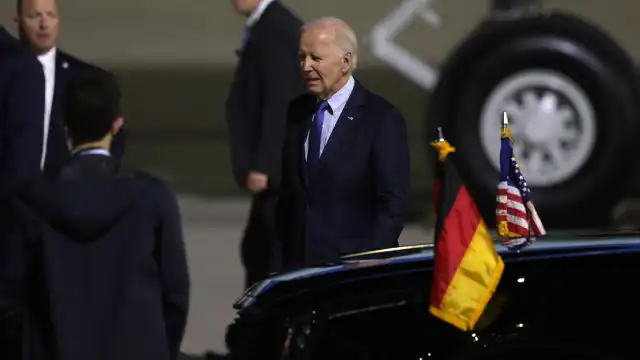30,000 Georgians take to the streets after "foreign agents" law passes
About 30,000 Georgians, protesting a controversial "foreign influence" bill passed by parliament that threatens to derail the country's bid to join the European Union (EU), rallied again in the center of the capital Tbilisi on Sunday.
© Nicolo Vincenzo Malvestuto/Getty Images

Mundo Geórgia
A lei on "foreign interference", inspired by legislation in force in Russia to suppress the opposition, was voted on Tuesday in final reading by Georgian MPs.
The demonstrations against this bill, which targets media and non-governmental organizations (NGOs) that receive foreign funding, have been going on for more than a month, bringing together considerable crowds waving European, Ukrainian and Georgian flags and chanting slogans against Russia, which waged war on Georgia in 2008, reported the France-Presse agency (AFP).
Thousands of people began today to block a major intersection in Tbilisi, paralyzing traffic in the central districts of the capital.
"We have been taking to the streets day after day for over a month and we will not back down until this Russian law is repealed," Anuka Liparteliani, a 19-year-old student, told AFP.
The foreign ministers of Estonia, Iceland and Lithuania, visiting the country, joined the march to the protest site, before addressing the crowd, in a show of solidarity with the demonstrators.
"We are here to support the aspirations of the Georgian people to be part of the European Union and NATO," Lithuanian Foreign Minister Gabrielius Landsbergis told AFP.
Protests against this law also took place in the western cities of Kutaisi and Tsalenjikha.
The head of European diplomacy, Josep Borrell, on behalf of the European Commission, called on Georgia to withdraw this law, considered contrary to the values and "essential standards" of the EU, having a "negative impact" on the accession process of this State.
Georgia also aspires to join NATO, whose spokesperson, Farah Dakhlallah, denounced on the social network X a measure that distances it from its "European and Euro-Atlantic integration".
The 27 member states of the European Union, however, failed to reach an agreement on a common text, due to opposition from Hungary and Slovakia, according to diplomats in Brussels. Portugal condemned the approval of the bill.
The UN High Commissioner for Human Rights, Volker Türk, also regretted "the impacts [of the law] on the rights to freedom of expression and association in Georgia", while the United States warned that they could reassess their relations with Georgia.
Georgian President Salome Zourabichvili, pro-European and in open conflict with the government, is expected to veto the new law, but the ruling party, Georgian Dream, claims to have enough votes in parliament to overturn it.
President Zourabichvili proposed amendments to the bill, but ruled out any artificial negotiations at a press conference with representatives from the Baltic and Iceland. Prime Minister Irakli Kobakhidze, in turn, said he was ready to discuss possible changes.
In its current form, the text requires any NGO or media outlet that receives more than 20% of its funding from abroad to register as an "organization pursuing the interests of a foreign power" and be subject to administrative control.
The controversy surrounding this text highlights the influence of Bidzina Ivanishvili, a wealthy businessman considered the shadow leader of Georgia.
Prime Minister from 2012 to 2013 and now honorary chairman of Georgian Dream, he is suspected of being close to Russia, the country where he made his fortune.
Although he claims to want to bring Georgia into the EU, he has recently made hostile statements towards the West and sees NGOs as an internal enemy, in a country that is going to legislative elections in October.
Read Also: MEPs reject controversial law in Georgia and want it withdrawn (Portuguese version)

Descarregue a nossa App gratuita.
Oitavo ano consecutivo Escolha do Consumidor para Imprensa Online e eleito o produto do ano 2024.
* Estudo da e Netsonda, nov. e dez. 2023 produtodoano- pt.com





















